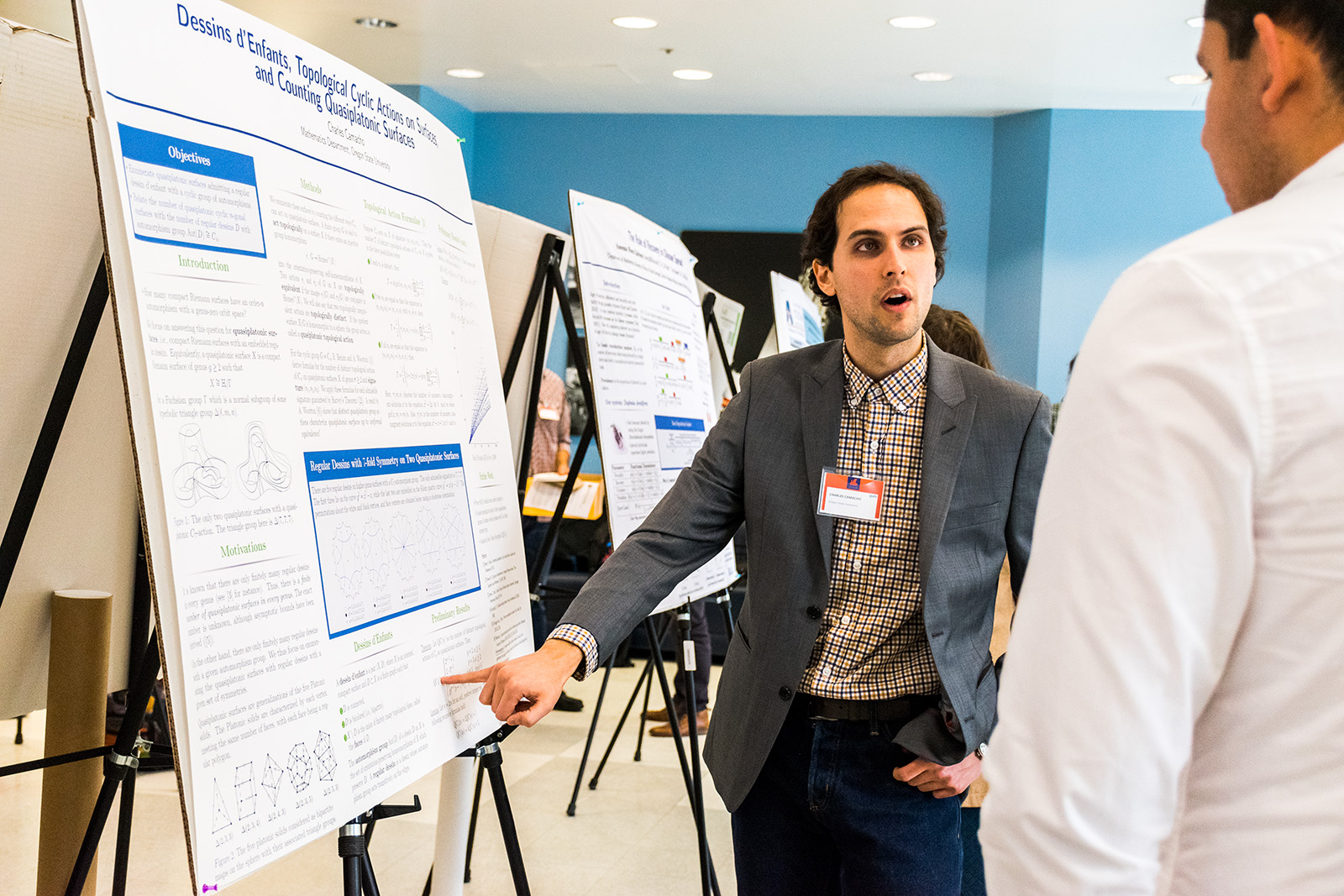Latinx conference discusses representation in STEM, resources for students

The Latinx in the Mathematical Sciences Conference 2018, held in Ackerman Grand Ballroom by the Institute of Applied and Pure Mathematics, aimed to open a discussion surrounding the Latinx academic community. (Farida Saleh/Daily Bruin)
This post was updated March 13 at 1:33 a.m.
Joanna Navarro said at an event Saturday that she often felt out of place in her statistics classes because there were few students who shared her Latina background.
“Even in my classroom, I see really stark disparities, an underrepresentation of black and brown (people),” she said.
Navarro, a graduate student in statistics, participated in Latinx in the Mathematical Sciences Conference 2018, held in Ackerman Grand Ballroom by the Institute for Applied and Pure Mathematics. The conference aimed to open a discussion surrounding the Latinx academic community by holding panel discussions on Latinx representation in mathematics, a poster session for Latinx students to present their research, and mentorship events for students to network with faculty.
Several professors shared their journeys of becoming mathematicians at a panel during the conference.
Talitha Washington, an associate professor at Howard University, said that Hispanic people make up 16 percent of the United States’ population, but only comprised 6 percent of those in STEM fields in 2010. She added institutions with high Hispanic enrollment and historically African-American universities are also experiencing a decline in the percentages of Latinx and African-American students in STEM majors.
“This is what we call underrepresented,” Washington said. “Something is not right with these two mappings of our U.S. demographic.“
Washington added this underrepresentation of Hispanic and African-American individuals may make it difficult for young minority students to imagine themselves in STEM fields.
“We need to be careful of the imagery. Oftentimes (minority students) won’t see themselves in the position they want to be in, so you need to create your own imagery,” she said. “If you ever find yourself in a room where you kind of feel like the other … raise your hand and be assertive.”
Washington said her pursuit of math was full of unexpected turns because she had no interest in pursuing math when she first entered college, but later switched her major to mathematics.
“Who knew that a mixed-race kid from Indiana, who is a math major, Spanish minor and (had) study abroad experience would now be a math professor?” Washington said.
Dagan Karp, an associate professor of mathematics at Harvey Mudd College who spoke at the panel, said he did not find math easy during his time as an undergraduate student.
“The lowest grade that I’ve ever received in college was a D in linear algebra, and this semester I’m teaching linear algebra,” Karp said. “There are lots of bumps along the road – don’t sweat it.”
Karp and Washington encouraged minority students to be comfortable with asking for help and using the academic resources their schools offer.
“When I need help, I’m not afraid of asking for help, because I find that when you ask someone for help, they also always have something to gain from that experience,” Washington said.
Attendees also met with mathematics researchers and faculty for career advice in a mentorship pairing event.
Robin Wilson, a mentor at the event and a topology professor at California State Polytechnic University, Pomona, said the mathematics community in Latin American countries is more welcoming compared to the United States. For example, when he visited a mathematics conference in Mexico, he felt the mathematicians there were more open-minded of his position as an African-American mathematician.
“I felt embraced by the community in a way unlike the U.S.,” he said. “I guess the culture of mathematics is different everywhere.”
Navarro, who found a mentor at the event, said she thinks there is also gender disparity in her classes.
“Statistics is a male-dominated field”, Navarro said. “I count three women in one of my statistics classes of 35.”
In a poster session designed to help less experienced students present on their research, undergraduate and graduate students also commented on their personal experiences as members of a sparsely populated community with event organizers and professors.
Students who attended said events like the conference are important to address their community’s disparity in mathematics.
Angelina Gonzales, a doctoral candidate in pure mathematics at the University of Arizona, said the conference was useful for her because there are few Latinx individuals in her department who are able to support her.
“This event is important for people who share my background to network with and promote my research as well,” she said.
José Ángel Sánchez Gómez, a fifth-year pure mathematics student from the Universidad de Guanajuato, said events like the conference help Latinx mathematicians connect with each other.
“It’s cool that events like these are organized,” he said. “It was refreshing to be surrounded with people in mathematics, but also sharing my background.”

